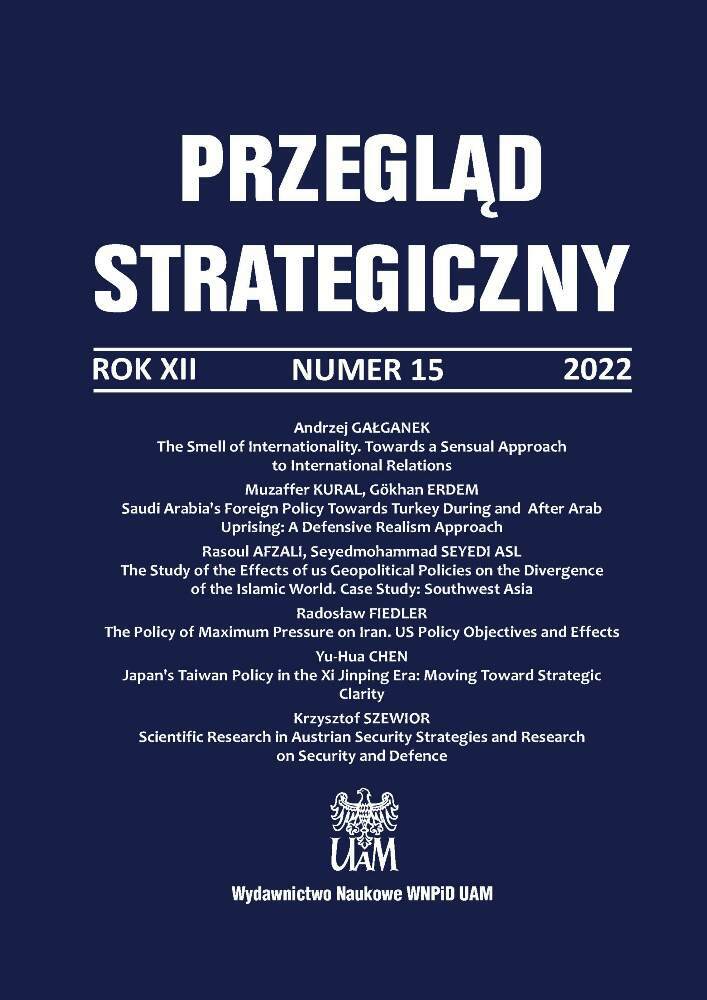Abstract
The tenet of this article is the conceptualisation of social multiplicity, rather than politics, being the deepest code of internationality as a property of human existence. As a consequence of that understanding of internationality, International Relations (IR) extends beyond dealing with the traditional concepts of politics and economy. All the manifestations of human activity arise in a context of social multiplicity, in which individuals are aware of paths of development separate from their own, and in which ideas, technologies and resources are constantly taken from one social environment and combined with others, in order to produce new and original results. From this perspective, IR concerns nearly everything: multiplicity and identity; multiplicity and sexuality; the interactive life of languages; structures of world literature; the unequal yet connected development of music; international relations of food and cooking; social strategies of dealing with difference, and internationality experienced through the senses.
This article illustrates how olfaction is present in international relations through power relations, olfactory others, the issues of migration and asylum, olfactory travelogy and alternative cultures of smell. The analysis confirms that sensual internationality may show a new aspect in understanding relations between politically organised societies. Sensuality – sensory experience – may be a foundation for a hitherto neglected way of understanding internationality. Sensual IR enables the discipline to return to the everyday life of internationality. It helps us to experience internationality and to dispose of the dominant belief in IR that internationality cannot be seen, or that we do not know where its “inter” is located or what it is.
References
Carlise J. (2004), Common Scents. Comparative Encounters in High-Victorian Fiction, Oxford.
Classen C. (1990), Sweet Colors, Fragrant Songs: Sensory Models of the Andes and the Amazon, "American Ethnologist", Vol. 17, No. 4. https://doi.org/10.1525/ae.1990.17.4.02a00070 DOI: https://doi.org/10.1525/ae.1990.17.4.02a00070
Classen C. (1997), Foundations for an Anthropology of the Senses, "International Social Science Journal", Vol. 49, No. 153. https://doi.org/10.1111/j.1468-2451.1997.tb00032.x DOI: https://doi.org/10.1111/j.1468-2451.1997.tb00032.x
Classen C., Howes D., Synnott A. (1994), Aroma. The Cultural History of Smell, London-New York.
Corbin A. (1986), The Foul and the Fragrant. Odor and the French Social Imagination, Leamington.
Drobnick J. (2006), Introduction: Olfactocentrism, in: The Smell Culture Reader, (ed.) J. Drobnick, Oxford-New York.
Gałganek A. (2021), Filozofia nauki o stosunkach międzynarodowych. Ontologia, epistemologia, metodologia, Kraków.
Greene G. (1971), A Sort of Live, New York.
Howes D. (2006), Sensual Relations. Engaging the Senses in Culture and Social Theory, Ann Arbor.
Kettler A. (2021), The Smell of Slavery. Olfactory Racism and the Atlantic World, Cambridge. https://doi.org/10.1017/9781108854740 DOI: https://doi.org/10.1017/9781108854740
Laplantine F. (2015), The Life of the Senses. Introduction to a Modal Anthropology, London.
Lash S. (1988), Discourse or Figure? Postmodernism as a Regime of Significance, "Theory, Culture & Society", Vol. 5, No. 2-3. https://doi.org/10.1177/0263276488005002006 DOI: https://doi.org/10.1177/0263276488005002006
Lifton R., The Nazi Doctors. Medical Killing and the Psychology of Genocide, New York.
Maclean S. F. (1964), Eastern Approaches, New York.
Marks K. (2005), Rękopisy ekonomiczno-filozoficzne z 1844 roku, Warszawa.
Orwell G. (1937), The Road to Wigan Pier, London.
Porteous J. D. (1988), Smellscape, "Progress in Human Geography", Vol. 9, No. 3. https://doi.org/10.1177/030913258500900303 DOI: https://doi.org/10.1177/030913258500900303
Puumala E. (2017), Asylum Seekers, Sovereignty, and the Senses of the International. A politico-corporeal struggle, London-New York. https://doi.org/10.4324/9781315671215 DOI: https://doi.org/10.4324/9781315671215
Reinarz J. (2014), Past Scents. Historical Perspectives on Smell, Urbana. https://doi.org/10.5406/illinois/9780252034947.001.0001 DOI: https://doi.org/10.5406/illinois/9780252034947.001.0001
Rodaway P. (1994), Sensuous Geographies. Body, Sense and Place, London-New York. https://doi.org/10.4324/9780203306864 DOI: https://doi.org/10.4324/9780203306864
Rosenberg J. (2016), International Relations in the Prison of Political Science, "International Relations", Vol. 30, No. 2. https://doi.org/10.1177/0047117816644662 DOI: https://doi.org/10.1177/0047117816644662
Rosenberg J. (2018), IR 101, "International Relations", Vol. 32, No. 2. https://doi.org/10.1177/0047117818774726 DOI: https://doi.org/10.1177/0047117818774726
Stoller P. (2004), Sensuous Ethnography, African Persuasions, and Social Knowledge, "Qualitative Inquiry", Vol. 10, No. 6. https://doi.org/10.1177/1077800404265727 DOI: https://doi.org/10.1177/1077800404265727
Szołtysek A. E. (2018), Filozofia umysłu, Kraków.
Vigarello G. (1998), Czystość i brud. Higiena ciała od czasów średniowiecza do XX wieku, Warszawa.
License
Copyright (c) 2022 Andrzej Gałganek

This work is licensed under a Creative Commons Attribution 4.0 International License.

